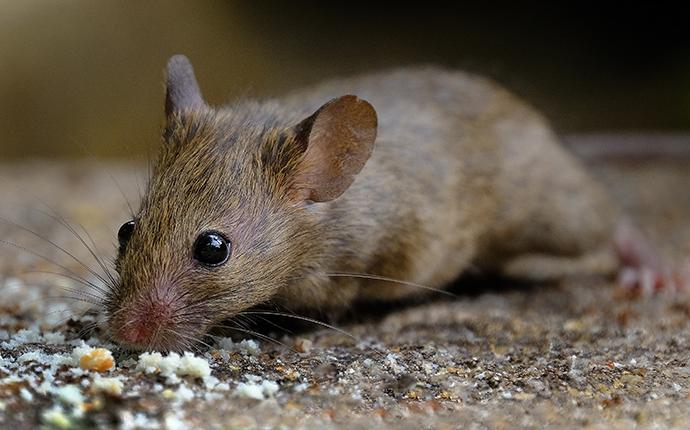
Rodent Identification (Rodentia)
What are rodents?

Rodents are small mammals characterized by having two incisors which must be kept short by gnawing as they grow continuously. In Washington, the most common rodents homeowners come up against are mice and rats. Rodents have a long history of spreading diseases, damaging property, playing host to parasites, and generally causing all manner of problems when they are allowed into human structures. Rodents can damage your home, destroy your personal items, and put your family at risk of disease and infection. Read on to find out more about rodents, the problems they cause, and why preventing them from getting into your home or business is essential.

A member of our team will be in touch shortly to confirm your contact details or address questions you may have.
Types Of Rodents In Western Washington
Deer Mice
The deer mouse are small rodents measuring about 5 to 8 inches in length. They have brown fur on their backs with white feet and underbelly. The name “deer mouse” comes from this color patterns, making them resemble a white tailed deer. Deer mice move about on the forest floor beneath the concealing cover of the leaf litter, and they nest in well hidden burrows, rock crevices, brush piles, and tree holes. Their coloration gives them natural camouflage in these locations.
Deer mice often nest in sheltered outdoor areas such as old fence posts, hollow tree logs or piles of debris. During the winter months, deer mice may invade homes, garages, sheds or rarely used vehicles to seek shelter. Inside, attics and basements make the ideal deer mouse habitat. The deer mouse also builds its nest in storage boxes, stuffed furniture, drawers and wall voids.
House Mice
House mice are a small species of rodent that are among the most recognizable rodent species in the country. The house mouse grows to between 5 ½ and 7 inches in length with large, rounded ears and scaly tails. Their fur ranges in color from grayish-brown to almost black, with lighter colored undersides, usually tan or off-white. Their other distinguishing features are their small pointed noses and their continuously growing front incisors that they must constantly wear down by gnawing.
Mice are typically attracted to properties that offer them easy access to food, water, and shelter. Bird feeders, unsecured garbage cans, woodpiles, gardens, and compost piles can all attract mice to your property. While mice can enter homes, garages, sheds, and other buildings any time of the year, they are especially problematic in the late fall when they are trying to secure a place to overwinter. Mice can enter buildings by squeezing their bodies through very small spaces; once inside, they are typically found hiding in places that are close to food sources including behind walls, in crawl spaces, behind large appliances, in attics, and in the back corners of cabinets.
White-Footed Mice
The white footed mouse grows to about six inches in length and is distinguishable by its dark brown upper body coloration with white, sock-like feet.
White-footed mice are omnivorous, and eat seeds and insects. They are timid and generally avoid humans, but they occasionally take up residence in ground-floor walls of homes and apartments, where they build nests and store food. Even though these mice are usually found outside, they may enter human structures during colder months in search of food and water. They typically enter campers, storage sheds, garages, and residential homes.
Field Mice
Field mice, also known as meadow voles, are stout rodents ranging between six and seven inches in length with coarse brown fur and light gray or white undersides. They have short, furred tails that reach twice as long as their hind feet.
Field mice are commonly seen near wooded areas with thick brush. While field mice don’t typically enter homes and workplaces, they can wander into buildings through cracks in foundations or loose doors and windows. Homeowners may also unknowingly carry them inside in bundles of firewood. More often, the pests harm the lawns and gardens of private residences, commercial farms, and other businesses. Their small size helps them hide in tall grass, squeeze through gaps in fences, and get into orchards.
Norway Rats
The adult Norway rat grows to between 7 and 9 ½ inches in length with a strong, stocky body built for swimming. Norway rats have a rounded blunt nose, protruding small black eyes, small ears, and a bi-colored tail (darker on top, lighter on the bottom). Their fur is brown and is speckled with black hairs; the fur on their underbelly is lighter in color-usually gray or white.
Because of their heavy bodies, they aren’t great climbers, so instead of climbing into the attic they typically invade basements and the first floors of homes.
Roof Rats
Roof rats are dark brown or black in color and reach about 6-8 inches in length. The body of the roof rat has a long, thin, delicate build and grows to between 6-8 inches in length. Their long scaly tail adds another 6-8 inches to their total body length. Roof rats have a pointed nose, large ears and large eyes.
Unlike their Norway rat cousins, roof rats are built for climbing, and are often found climbing trees in order to access buildings through the roof.
Black Rats
Black rats are small relative to most rats, about 5-7 inches long. Despite its name, the black rat can actually come in several colors, though naturally is usually black on the back with a lighter underside. The black rat also has a scraggly coat, and is slightly smaller than the brown Norway rat. Black rats are generalist omnivores. They are serious pests to farmers as they eat a wide range of agricultural crops.
Our Reviews
Hear From Your Friends & Neighbors
-
“Richard was friendly, professional and communicated well. Had Yellow jacket nest in siding sprayed. Hard to get at, but they appear to be eliminated”- D. Mando
-
“I’ve been receiving services for over a year initially to combat carpenter ant infestation. The ants were gone after 1 treatment and I’ve continued this service monthly to continue to manage any new issues. Very professional and great custom”- Marci B.
-
“Richard is wonderful to work with. He does an amazing job around our rural home and has always gone above and beyond to make sure we’re covered and he’s up to date on what’s going on around the house.”- Jonathan W.
-
“Richard has been very generous and willing to accommodate our desire to use little to no pesticides. Most importantly, our mice and wasps have disappeared! Highly recommend working with Guard.”- The Smiths
-
“My initial phone call with company was very helpful, providing me information about product that would be used and the assurance that company knew what they were doing.”- Irene Y.
-
“Great experience using them for my home. Guard pest control has been coming to my house for a long time now and they have helped keep critters from overtaking my house. Great service and good people 100% would recommend.”- Chris F.
-
“I booked an appt for my sister. She has two mice in her house. She was highly pleased with the results and the professionalism and environmental approach they took, and the price. Would highly recommend.”- Steve
-
“Thank You Richard and Guard Pest Control! It’s so nice knowing that you are taking care of all the bugs and pests for us. I appreciate you always taking the time to figure out what is needed at the time, and then making sure it’s taken care”- Janet B.

Our Blog
Recent Posts
Want all the latest news or updates? Browse through our blog to read our most recent posts and featured articles.





